#oenone
Explore tagged Tumblr posts
Text

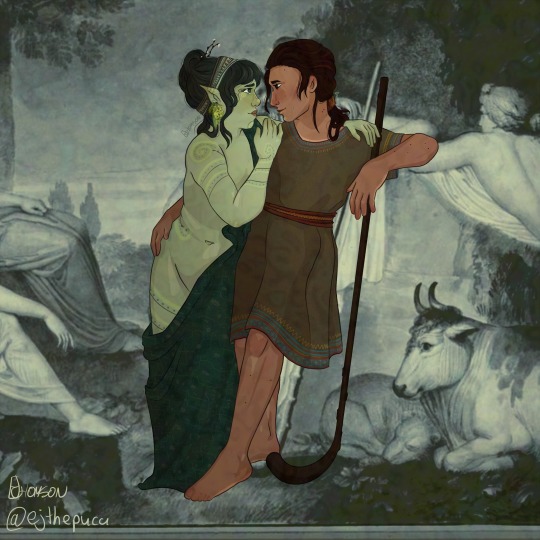
Paris and Oenone :D
Original by John Flaxman under the cut! Nudity Warning!
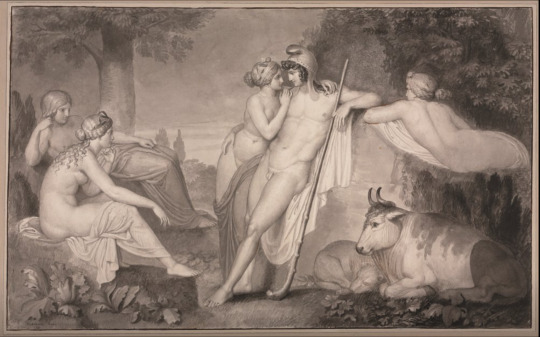
27 notes
·
View notes
Text
Man the hardsman's adopted son is off smooching trees again (featuring some Oenone doodles)

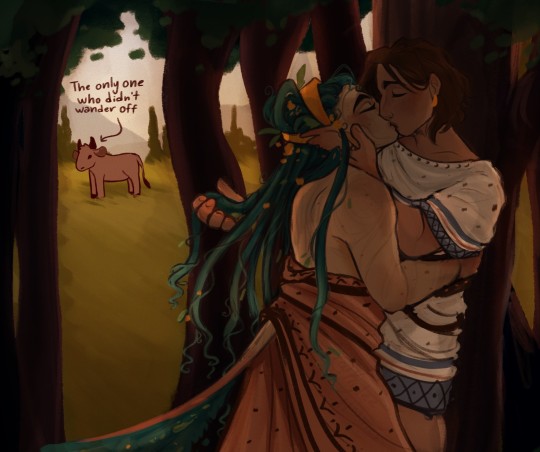
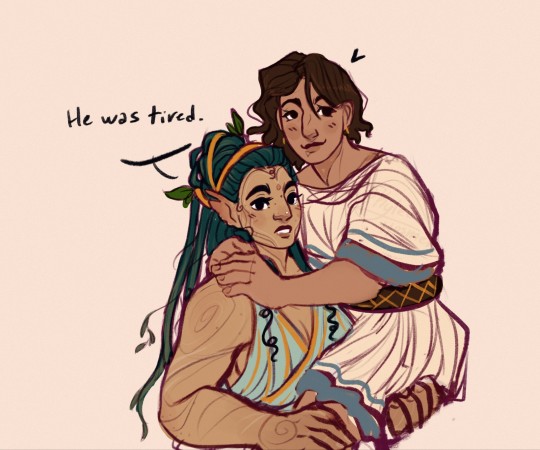

#greek mythology#paris of troy#Oenone#paris x oenone#paris my favorite boy failure#Oenone deserved better
657 notes
·
View notes
Text
Clytemnestra, Medea, and Oenone in the afterlife meet up and become a support group of husband killers and/or bad mothers. Also the Danaïdes attend their meetings
#i need these three bitches to look at each other and say EXACTLYYY#also hera visits them because of course she does. those are her girlfailure squad of wives#hera and medea become particularly close too in my mind#would clytemnestra judge the other 2 for what they did to their kids? maybe but I'm in favor of the version where cly almost kills orestes#so her hands are just as dirty#clytemnestra#medea#oenone#greek mythology#danaïdes#again just my silly thoughts
34 notes
·
View notes
Text
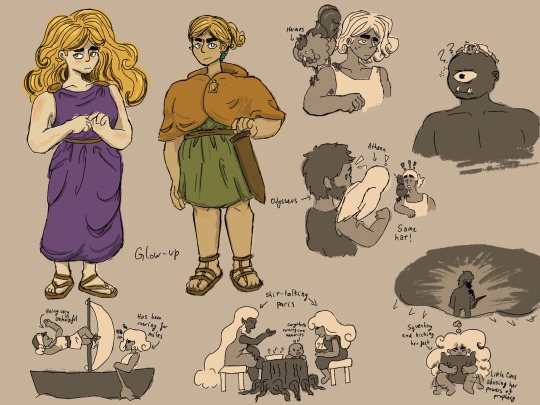
Hero Cassandra AU doodles!
#cassandra#cassandra of troy#hermes#odysseus#oenone#greek mythology#greek myths#the iliad#tagamemnon#fanfiction#fanfic#ao3#doodles
46 notes
·
View notes
Text






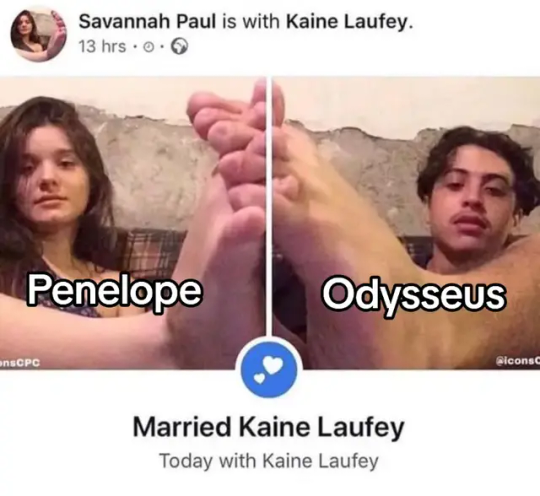


#greek mythology#the iliad#odysseus#hector and andromache#hector of troy#odysseus and penelope#Hermione#oenone#paris of troy#greek mythology memes
130 notes
·
View notes
Text
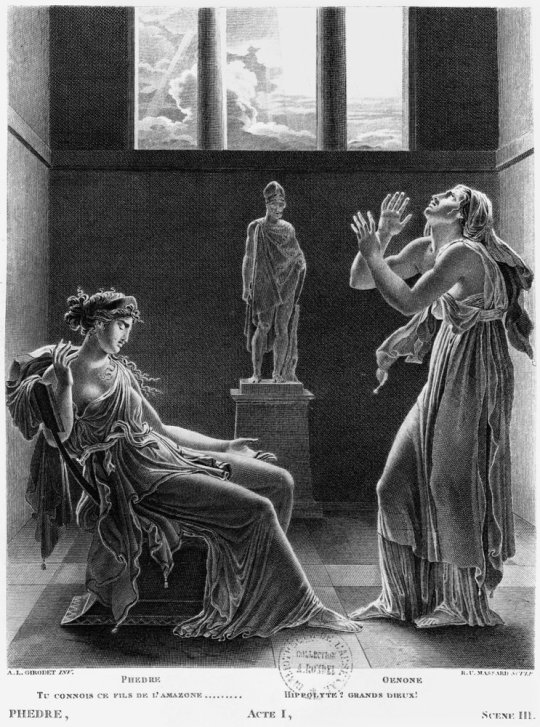
Phaedra and Oenone, illustration from Act I Scene 3 of 'Phedre' by Jean Racine engraved by Raphael Urbain Massard.
12 notes
·
View notes
Text
I was thinking about slavery in Troy…not only them being enslaved by the Achaeans, but about them enslaving people. Especially in relation to the fragments of the lost play Alexandros by Euripides.
Paris, abandoned as baby to die because it was prophesied that he would be the cause of the fall of Troy, was rescued by an enslaved man whose function was to be a shepherd. As the adopted son of a slave, Paris also grew up enslaved on Mount Ida with the same function as his adoptive father. There are other unnamed enslaved characters being compared to Paris in the play. I read the Portuguese translation by Maria de Fátima Silva, so I won't quote the texts directly, but with this play we can get some ideas about slavery in Troy. Here I'll focus on the fragments that are relevant to this topic and I will also not discuss the possibilities of location in the play and speaker attribution to these lines, as this isn’t the focus of this post now as I only intend to summarize the ideas.
One of the fragments (Pap. Oxy. 3650) says that Paris seemed superior in nature to the shepherd who raised him and acted in a manner considered arrogant, to the point of annoying the other shepherds (probably also enslaved men). He apparently also defeated prince Deiphobus in Funeral Games, which caused annoyance to Deiphobus and his companions, who asked queen Hecuba that Paris be killed since it was outrageous that royalty should be defeated by a slave. Here, the mere “audacity” of a slave to show himself to be better at something is a threat to hierarchical social customs. Not only does a person, being enslaved, lose their rights, but they are forced to live in the shadows of free people. Even if they have superior abilities, they must not show them. Because, from the moment they show it, then they're threatening a hierarchy that says they're inferior and free people are superior.
(Still in the same fragment) We have the idea that Paris had his life at risk simply because he was better than royalty, but at the same time… he is royalty by birth. Even though he was enslaved like common people, his having high status from birth made him naturally different from others (for example, the comment about him supposedly being superior to the shepherd who raised him, although he was raised the same way. Why specify this?). The Chorus (who argues for Paris, here thought not to have royal status yet), on the other hand, in frags Stobaeus 4.29.2 and 4.29.7 argues about how moral nobility is more relevant than nobility of blood. But anyway, this becomes ironic with the eventual discovery that Paris was, in the end, noble by blood. In the end, Paris isn’t really the best example for the anti-elitist argument proposed by the Chorus. This makes the play, in its moral lesson about how enslaved people can still be valued even WITHOUT having noble blood, ironic.
In frag Stobaeus 3.4.31, the defeated rivals apparently complain about the supposed injustice of giving victory to slaves rather than free men, again emphasizing that it’s more dishonorable to lose to a person of lower social status. If an enslaved person is inferior and you lose to one of them, what does that make you? This argument about the injustice of this by Deiphobus and his companions is repeated in frag Stobaeus 4.47.10 too. In another fragment (Stobaeus 4.19.4), someone seems to be talking about Paris to Priam, arguing that there is no evil or useless thing than a slave who shows himself to be more arrogant than necessary. Again, the idea that a person, when enslaved, must know their "place”. It’s still debated who says this, but in any case there is clearly a theme of hierarchy between masters and the people enslaved by them. It's theorized that this argument may have happened after Paris's victory, which could imply that his victory over royalty is also an act of arrogance. As someone who was once enslaved, he should have known better than to excel princes.
In frag Stobaeus 4.19.15, someone talks about how slaves are worthless and narrow-minded, and in frag Stobaeus 4.19.16, someone talks about how enslaved people who are "sympathetic" to their masters apparently tend to constantly be in conflict with others like themselves (i.e., other enslaved people). Probably a reference to people who, in an attempt to gain favor with their masters, turn against their own class (I think Eurycleia, in The Odyssey, is a good example of this). And they do the same to Paris here, accusing him of not knowing his place as a slave even though they're also enslaved. In frag Stobaeus 4.19.20, someone says that having slaves who are superior to their masters isn’t good. Again, the idea that the master is master because he is superior and the slave is enslaved because he is inferior. They probably refer to Paris, here still in condition of slavery. The first line alludes to his “arrogance” (which, by the way, is considered arrogance for a slave, remember), the second line alludes to other enslaved characters being bothered by his supposed arrogance, and the third line alludes to Paris defeating royalty in the Funeral Games.
In frag Stobaeus 4.22.87, someone talks about how those who are enslaved marry each other, alluding to the idea that enslaved people cannot marry free people, thus generating an even greater hierarchical social gap. A person, being enslaved, doesn't have the rights of a free person and suffers a specific social exclusion. They no longer have the events that a free person would have. Even when they're present at such events, they are servants and not part of the moment. Although slavery was constant, it is as if these people were thrown to the margins of society to the point that they're just footnotes in the history of free people. And this is reflected in marriages. You cannot love a free person and a free person cannot love you, because that isn't the natural order. The hierarchy says that you will marry another person of the same status as you, that is, an enslaved person.
This detail makes it even more interesting how, in a considerable number of sources, Paris on Mount Ida is married to a goddess: Oenone. I wonder, therefore, if in these versions Oenone is his first wife, doesn't this already indicate how Paris is supossed to not be like the other enslaved people. Because in the end, he still has royal blood and, unlike common people, this allows him to be free. When he is discovered, he is freed from slavery. This won't happen to common people. And even Oenone's act, as a goddess, marrying not just a mortal, but an enslaved mortal, probably only happens because, having prophetic powers, she always knew that Paris was royalty. I wonder, if Paris weren't royalty, would she still be willing to be his wife? The only source I know of that touches on this subject is a Roman text, more specifically Ovid's Heroides. Oenone, in venting her frustrations, uses the fact that Paris had been a slave against him when she says: "Not yet so great were you when I was content to wed you – I, the nymph-daughter of a mighty stream. You who are now a son of Priam – let not respect keep back the truth! – were then a slave; I deigned to wed a slave – I, a nymph!". She saw the idea of her marrying him as something he should be grateful for, not just because Oenone loved him, but because Oenone loved him enough to deign to marry someone who was theoretically inferior to her.
Anyway, in this play we have Deiphobus and Hector having opposing opinions. Extremely offended, Deiphobus argues in favor of killing Paris, as he considers it dishonorable for a slave to stand out. Hector, on the other hand, isn’t bothered by the situation and is much more cautious and controlled than Deiphobus, trying to argue how unnecessary and excessive this behavior is. Hecuba listens to both of them to make the final decision, finally deciding that Paris must be killed even if it’s in an ambush. To Hecuba, Deiphobus' arguments about their family being outraged by Paris' victory are more convincing than Hector's arguments. She sees the idea that the son of an enslaved woman excelling over the sons of a queen cannot happen or it will harm the House of Priam (some suggest that the fragments imply that Hecuba believes Paris to be the son t of Priam's relations with an enslaved woman and that this therefore increases Hecuba's anger towards Paris as she thinks he is the illegitimate son disrupting the stability of the legitimate children). However, Hecuba and Deiphobus are unable to kill Paris, as Cassandra prevents them by revealing the truth of Paris's birth. Discovered as the son thought to be dead (which Hecuba had already lamented elsewhere in the play), it’s no longer dishonorable to lose since Paris is noble by blood and part of the family. Thus, Hecuba and Deiphobus no longer attempt to kill him and Paris is reunited with his family. This is stated in the fragments found in a papyrus from Strasbourg.
And this is interesting because of Hecuba. Hecuba, who in other plays by Euripides, is the representation of the victim filled with rage and grief. In the play Hecuba, she shows us the injustice of what happens to her children and takes revenge for it. In Trojan Women, she is the leading voice among the enslaved women and even tries to kill herself as a way to escape this horrible fate. And yet, in this lost play by Euripides, she is in the position similar of the Achaeans: she is the most powerful free person who, disregarding that an enslaved person is still a person, is willing to exercise her power in name of her own desires. Why? Because she has power to do it, she can do it. She would be willing to allow and collaborate in the death of Paris, if he weren't the lost son she so mourned. Because, as an enslaved person, he should know his place. Because he shouldn't dare to outdo her royal, legitimate and free sons. That is, until he reveals himself to be her son. Then it is no longer arrogance on his part, it's no longer unforgivable. And predictably, Paris, upon becoming a prince, will have slaves too. Euripidean Hecuba shows how hierarchies change in times of war. Those who once had power no longer do. And if before she could use her power over other vulnerable people, then now she is the one on the vulnerable side of the situation. She is the one who experiences the despair of, as an enslaved woman, having her voice ignored. In the same way that she ignored Paris' voice when she thought he was the son of a slave. The idea that she saw Paris as the son of a slave becomes even more ironic when we think of the future in which, indirectly because she takes him back, he will actually become the son of a slave since Hecuba will suffer the cruel fate of being enslaved.
And this irony regarding Hecuba's social position is acknowledged in the play Hecuba, when she says to Agamemnon "I was once a queen, but now I am your slave; [810] a happy mother once, but now childless and old alike, bereft of city, utterly forlorn, the most wretched woman living" (E.P. Coleridge). In the same way that a happy mother is the opposite of a childless and old woman, being a queen is the opposite of being a slave. Hecuba experienced both privilege and a state of extreme vulnerability. Because that's what war does to people: it destabilizes societies, including social hierarchies that were once considered rigid. And yet, it's not entirely the same because in the end she still has noble blood. Hecuba says "Guide these aged steps, my servants, forth before the house; [60] guide and support your fellow-slave, once your queen, you maids of Troy", thus acknowledging that she is in the same position as those who once served her (the Chorus). But, even now, she sees the Chorus as servants. And the Chorus still calls her "my royal mistress" in Trojan Women. Even when they're supposed to be in the same situation, Hecuba's previous position is a strong discerner of why they're supposedly different. They're both slaves, but they don't come from the same origin.
The aspect of the play Alexandros constantly questioning the idea that a common slave is inferior and arguing that nobility isn't in the blood in a way that is at least ironic considering that Paris is noble by blood is also reflected, in a way, in the play Hecuba through Polyxena. When talking about her being enslaved, Polyxena doesn't criticize the slave system, but criticizes the idea that she, a princess, is now a slave:
Polyxena Odysseus, I see you hiding your right hand beneath your robe and turning away your face, so that I may not touch your beard. [345] Take heart; you are safe from the suppliant's god in my case, for I will follow you, both because I must and because it is my wish to die; for if I were unwilling, a coward would I show myself, a woman faint of heart. Why should I prolong my days? I whose father was lord [350] of all the Phrygians, my chiefest pride in life. Then I was nursed on fair hopes to be a bride for kings, the center of keen jealousy among suitors, to see whose home I would make my own; and over each lady of Ida I was queen; [355] ah me! admired among maidens, equal to a goddess, save for death alone, but now I am a slave! That name first makes me long for death, so strange it sounds; and then perhaps my lot might give me [360] to some savage master, one that would buy me for money—me the sister of Hector and many others—who would make me knead him bread within his halls, or sweep his house or set me working at the loom, leading a life of misery; [365] while some slave, bought I know not where, will taint my bed, once deemed worthy of royalty. No, never! Here I close my eyes upon the light, free as yet, and dedicate myself to Hades. Lead me away, Odysseus, and do your worst, [370] for I see nothing within my reach to make me hope or expect with any confidence that I am ever again to be happy. Mother, do not seek to hinder me by word or deed, but join in my wish for death before I meet with shameful treatment undeserved. [375] For whoever is not used to taste of sorrows, though he bears it, yet it galls him when he puts his neck within the yoke; far happier would he be dead than alive, for life bereft of honor is toil and trouble.
For Polyxena, it isn't that people don't deserve to suffer this fate. It's that she, as Trojan royalty, daughter of Priam, sister of Hector, someone who was revered on Ida, someone who should have had a marriage considered worthy and prosperous, someone who could be fed with infinite hopes, doesn't deserve it. Just as Paris escapes his slavery on Alexandros by revealing himself to be a prince by birth, so Polyxena must be able to escape these precarious social conditions. Not only because it's cruel, but because she is a princess.
When Talthybius reports Polyxena's death to Hecuba, he tells her that before she died, Polyxena proclaimed “O Argives, who have sacked my city! of my free will I die; let no one lay hand on me; for bravely will I yield my neck. [550] By the gods, leave me free; so slay me, that death may find me free; for to be called a slave among the dead fills my royal heart with shame.” Again, slavery isn't only obviously painful, but it's shameful because she used to be a princess. Her "royal heart" is filled with shame at this possibility.
This shows a peculiar scenario in which these characters don't criticize the system when it affects common people, they criticize the system when it affects them. And when they're at the top, they still exercise this system against other people since, being free royalty, they have slaves (e.g., in Sophocles' lost play Troilus, Troilus is accompanied by an enslaved man who serves the Trojan royal family. In Alexandra, according to Ioannis Tzetzes, the character who relates Cassandra's prophecies is an enslaved man ordered to do so) and, in the case of Hecuba, even condemns them without a valid reason. Just because she is offended and has the power to do so. Slavery is more humiliating to Polyxena because she was a princess and therefore it is unnatural for her to be enslaved. Not because it's inhumane for people to be enslaved, but because she was born with a higher status and therefore her being enslaved is a break with the social hierarchy. This only happens because it's a time of war and wars are occasions when stability, whether good or bad, is ignored. Paris was arrogant as a slave, but as a prince, it's justifiable. And as a prince, he will have slaves. Even when these royal figures experience this vulnerable and marginalized condition, they don't think about the victims as a whole, but rather about the idea of how the "normal" is being challenged.
Anyway, because people sometimes misinterpret posts, please note that I'm not saying that Paris, Polyxena, and Hecuba weren't victims while they were enslaved or, because they also maintained a slave system, they necessarily deserved it. Paris still didn't deserve to grow up enslaved, Polyxena didn't deserve to be in a situation where death seemed better to her than life, and Hecuba didn't deserve to be separated from her family and treated the way she was by Odysseus. That isn't the point. The point is how even those who had power and exercised power over others can become those with less power and are victims of the power of others. The point is how even though they were both enslaved, there was a different view of the idea of royalty and the common people suffering this. The point is that, even though the Trojan royal family is currently known to have been enslaved, in the "normal" state of affairs they were slave owners. Anyway, the point is about much more than just the characters, it's about what I think they can symbolize. In the case of Hecuba, in particular, the way war changes things. In the case of Paris, the way he has, in a way, always been an "other" (he's the foreigner, he's the effeminate one, he's the prince who grew up enslaved, the enslaved one who had a very "princely" attitude, etc). In the case of Polyxena, it's symbolic of someone who grew up with a prosperous future promised to her only to get nothing. We don't even know anything about Polyxena before the Trojan War because she was too young to have any relevant stories. And we won't know anything about her after the Trojan War because there is no Polyxena after that. She's dead.
Also, even when slavery is the focus, the character heard most is usually the one who previously had status (Andromache, Hecuba, Polyxena, Cassandra get more focus than the common enslaved women, for example. Among Helen's servants, Aethra is the only one freed and the only whe know the story. Electra talks about how cruel it is that Clytemnestra treats her like a slave, but Clytemnestra's slaves don't talk about their pain. Etc).
But anyway, opinion post. Someone probably disagrees.
41 notes
·
View notes
Text
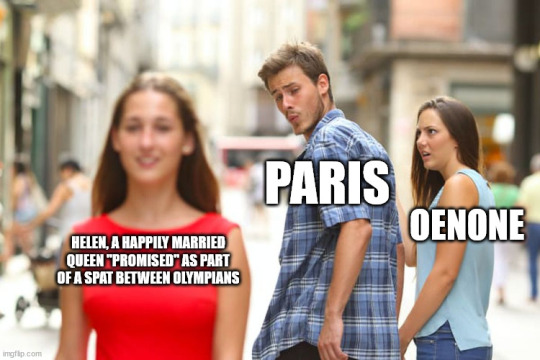
I hope the Greek Mythology side of Tumblr finds this passable
56 notes
·
View notes
Note
hello! whats your opinion on Paris and his relationship with Oenone, his forgotten first wife? a lot of people here on Tumblr have mixed views on it, some hating on Oenone and others hating Paris (I am siding with Oenone here lol)
But what do you think?
That is a good one. I would guess depends on who tells the story but either way the fate of the characters are definitely tragic. Different authors present different events so here goes;
For once Apollodorous seems to be indicating a certain level of bitterness between them at least from Oenone's part, given how she warns him not to go and pick Helen since she heard the prophecy on the demise that would follow. Of course with this turn of events Oenone feels betrayed by Paris and thus leading to her refusal to heal him when he runs at her in Ida when he is shot by Philoctetes and his poisonous arrows. However it also seems that Oenone loved him deeply still for she regretted her refusal, took healing herbs and followed Paris to Troy (where he was carried to after her refusal to heal him) but it was too late. Upon Paris's death at Troy she hanged herself in desperation.
Now Photius who seems to be quoting the Augustean mythographer Conon, he brings a more...spicy story between them (no surprise there given how Conon does seem to be speaking on more spicy matters hehe). So basically according to that story Oenone and Paris had a son named Korythos who exceeded his father in beauty. Oenone seems to be bitter towards Paris for his new marriage to Helen and so she sends her own son to Helen not only for the plot against her but also to arouse jealousy to Paris (by the way Helen's reaction to it is not mentioned by Conon so it is unclear if she...liked Korythos or not). Paris got furious and ended up murdering his own son causing Oenone to be furious and curse him to die, inspired by the existing prophecy, for him to be wounded by the Greeks and ask for her help. But when that prophecy came into reality Oenone sent Paris away, refusing to help him and told him "to go to Helen instead". She regretted it later, went to Troy, found Paris she cried over him and then hanged herself with her belt.
Parthenius gives us more information in his work "Narrations of love" in which he presents the background of their relationship and it starts as an idealistic and romantic love story in which Paris meets Oenone while he is a Shephard and he marries her taking her to Ida with him where they share a happy life and Paris swore to his beloved that he would never leave her or desert her. Oenone who had the power to predict the future told him that indeed he loved her now but that it would change. She even tried to tell him on the fate that would befall him but every time Paris would stop her and not let her finish. That seems to be part of the root of Oenone's bitterness for after she goes back to her homeland and Paris arrives to her she says the same thing that Conon also mentioned that he should "go to Helen now for healing". However Parthenius speaks on her love more loudly. He mentions how she runs after the messenger that bore her message at the same time but apparently the messenger found Paris first and Paris lost all hope that he would find help from her. Once again the ending seems the same (although Parthenius doesn't specify the way she ends her life)
Quintus Smyrnaeus and Ovid have their own very long and emotional versions of the myth. I would definitely look for Quintus for he seems to be faithful to what we read on the Epic Cycle with his Posthpmerica but of course that is a matter of taste as well as you see the myth itself has many versions.
However all versions seem to agree on some factors;
Oenone and Paris seemed to deeply love each other
Oenone seems to know on the fate that befalls Paris beforehand and oftentimes Paris seems to know the outcome
Oenone acts bitter to Paris refusing to help him even if he is dying but immediately regretting it out of her love for him
Oenone gives an end to her own life after perceiving Paris dead (usually by hanging herself)
It is hard for me to "pick sides" given how complicated the situation is. On the aspect of fidelity of course one can say that Paris is in the wrong. He basically deserts his wife to marry Helen and he seems in his desperation to seek help from his first wife even after the way he treated her. However I find it interesting how Oenone in all versions is aware of the game of fate, she knows what will happen and she knows that people cannot escape their fate and yet she has such a human reaction to be jealous and bitter to Paris. Also her refusal to help him even if Paris begs for his life. She knows that Paris would be wounded by a Greek and that he would have no way to heal himself but by her own hand. The prophecy for most myths doesn't specify her role further of it and his death seems to be left to her hands only.
Of course one can say that fate being unclear is not uncharacteristic but I find interesting how her bitterness would go (quite understandably I would say) so far as to refuse a dying man to heal him. On that aspect she is "in the wrong" in one essence since she has the power of life and death over him but of course one can understand where she comes from and why she chose to do what she did.
Ultimately I think no side is blameless just for different things. Of course if one talks about "who started it" then yeah one can point fingers to Paris and speak about the way that he abandoned Oenone for Helen. On the other hand his fate was predetermined and as we know there is no escaping from fate and there is a thin line between fate and choice in Greek mythology so in one way how much was Paris's fault and how much was fate is hard to tell. If fate wasn't in the middle I am sure one could blame Paris much more but still speak about how Oenone did not just deny Paris shelter or food she denied him his own life by condemning him to death essentially (thus her own guilt after all) but since the predetermined fate is in the middle it becomes more blurry.
I hope that makes sense.
#katerinaaqu answers#greek mythology#tagamemnon#homeric poems#the iliad#iliad#epic cycle#the epic cycle#paris#paris alexander#oenone#paris and oenone
43 notes
·
View notes
Text
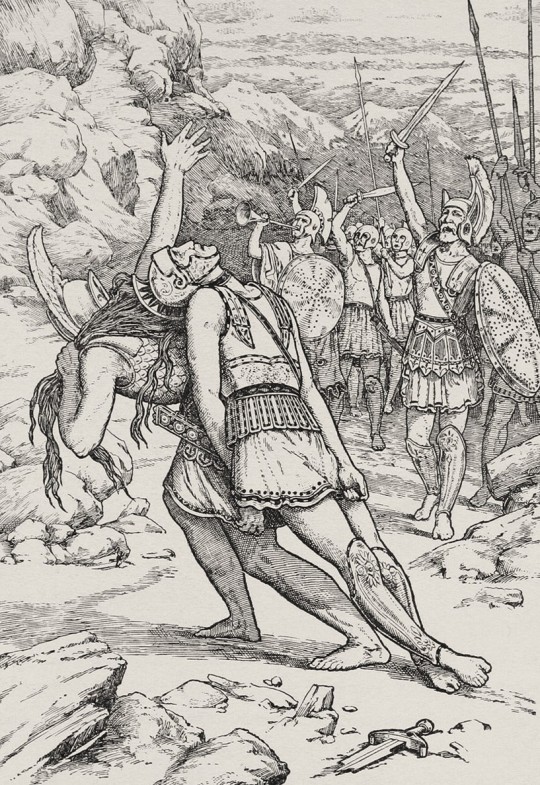
Menelaus was bearing him in triumph towards the Achaean host., from Paris and Oenone for Children of the Dawn: Old Tales of Greece by Frank C. Pape (1908)
#frank c. pape#art#illustration#golden age of illustration#1900s#1900s art#vintage art#vintage illustration#vintage#english artist#british artist#books#book illustration#mythology#greek mythology#menelaus#paris#oenone#trojan war#classic art
380 notes
·
View notes
Text
Sorry Oenone...
514 notes
·
View notes
Note
Oenone deserved her happy ending, God I hate that she committed suicide for Paris and they blame her for abandoning him when he abandoned her
You get it! T-T
Oenone should've been kissing girls like Medea and lived the rest of her days in peace, like why commit to her being the "bitter first wife" who refused the man who abandoned her (AND THEIR KID BTW) medical care then retract it and say she regrets it? And lose her life for it? Like no! Let her be mean! Anyone who blames her gets my fists!
(Alternatively, I do view Oenone refusing to treat Paris as a sort of karma for killing Corythus, their forgotten son. Either way her dying is so stupid and I wish authors back then knew what to do with her character.)
#oenone#corythus#oenone if i was your man i wouldve chosen athena or hera for you. hera specifically so we can live out as a power couple conquering kingdom#i would not be weaksauce at all for her#sighs#asks#the iliad#epic cycle
15 notes
·
View notes
Text
ROUND ONE
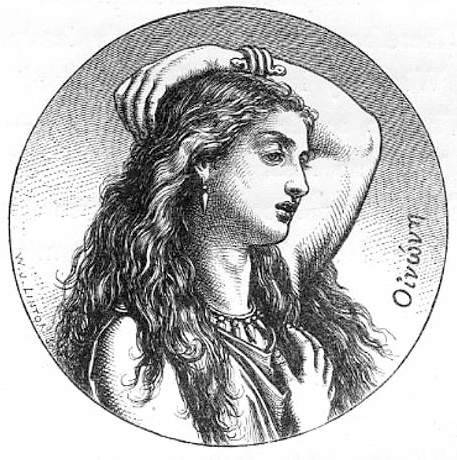

Propaganda
Oenone: First wife of Paris, he abandoned her for [Helen]. She threw herself upon his funeral pyre
The Waitress: homeless. canonically longs for a child so hard she watches children play at daycares. slept with her stalker. went to highschool with the main cast but was so forgettable nobody can remember her name to this day.
#the sadboy tourney#the sadgirl tourney#oenone#greek mythology#greek myth art#the waitress iasip#it's always sunny in philadelphia
11 notes
·
View notes
Text
I'm going to do something controversial
and defend Paris of Troy (well... sort of... he's still a dick, fuck that guy... but like... also in a very unenviable position)
reminder, there isn't really a mythological "canon", I do not intend to deliver to you the 100% canon accurate interpretation of the story of Paris, because there is no such thing.
Moving on, Paris' situation was kinda fucked, and I think there's some interesting things to be said
let us first explain who Paris is for those unaware, most of what I'm about to say is recounted in PseudoApollodorus' Bibliotheca
Paris was born to Hecuba and Priam, queen and king of the city of Troy
before he was born his mother had a nightmare that she would birth a torch that consumed the city in flame, and it was decided that this meant her son would bring the downfall of Troy
they wanted to kill him, but the guy they had kill him chickened out and chose the human option... of leaving him in the wilderness to die, as one does. You know what they say, if can't use Plan B, Plan C it is.
now luckily (or rather unluckily) he survived, and came to be raised as a shepherd. Interestingly according to Ovid, and I believe nobody else, Paris actually was a slave during this period of his life, though it makes sense, many abandoned children did get enslaved, to my knowledge, this was especially common in Rome, so this may be Ovid viewing this through a particularly Roman lens here.
According to PseudoApollodorus, Paris was pretty cool in his childhood, getting the name Alexandros, "defender of men" for being cool, and fighting off bandits and shit.
Eventually, through details we sadly lack to my knowledge, Paris fell in love with a nymph, Oenone. Sadly, there's not a ton attested about her, but what we do have seems to portray a genuinely positive relationship, though Oenone prophesied its eventually end due to the love he would develop for a foreign princess which would be his undoing.
moving on to the famous Judgement of Paris. Hera, Aphrodite, and Athena appear before the young Paris, and ask him which goddess is the most beautiful, and each offered him something in return for his answer being them. I want to note... there was no good answer here, I've seen people say "well [insert answer] would've been better." there wasn't a good answer, it would always have pissed off two of these goddesses, and also most certainly lead to Paris' and Troy's downfall, because that is what the Fates foretold, you can't just get out of a prophesy, any action would just lead you back to it.
In many ways, his choice of Aphrodite for the hand of Helen is actually a really genre-savvy answer from one perspective. He's promised power, glory, or love, and he chooses love. In many stories this would be the right answer, forsaking those other things for what really matters, love. Of course, this ends up being bad because... well first of he's cheating on Oenone, and, oopsies, Helen is married, and anyone who kidnaps her is going to be invaded by basically every Greek!
Thing is... did Paris know this? Did the shepherd/maybe slave know who tf Helen was? Realistically no. It's very possible in this situation to with no context, think, "Oh the last one seems like the least likely to blow up in my face."
as for the cheating thing, let me remind you... Aphrodite is the goddess of love, her retinue, the Erotes were generally believed to be able to overcome people with immense romantic feelings
In the Fall of Troy by Quintus Smyrnaeus, Paris tells Oenone as he dies, that it was not of his will that he abandoned her
now, the easiest way to take this is Paris is begging for his life, and is trying to present himself as a victim to evoke empathy to convince her to help him
however... considering the gods involved... yeah no it's possible he's being genuine here
In Ovid's Heroides, Oenone says this "Your tears fell as you left me – this, at least, deny not! We mingled our weeping, each a prey to grief; the elm is not so closely clasped by the clinging vine as was my neck by your embracing arms." which certainly strengthens the idea that Paris was heavily conflicted but moved by divine will
admittedly, I don't have much else to say, but idk, just some interesting things I don't see mentioned that often in reference to Paris (I also learned that Ovid called him a slave once? I did not know this, I learned this while looking for sources, oddly I've never seen anyone talk about this, I'm more interested in this now than anything else, like, I know it's just one line, but damn now I'm really curious what stories Ovid had access to that are today lost that made him say that.)
oh yeah also, you're welcome for siting my sources, because so many other sites I found talking about Paris that I read as a refresher, just didn't have sources, not even Wikipedia for a lot of that! I'm still mad about that so I made sure to mention my sources, if anything due to being petty and wanting to be better
#greek mythology#Paris of Troy#Oenone#Ovid#pseudoapollodorus#heroides#bibliotheca#Aphrodite#Trojan war
52 notes
·
View notes
Text
oh daaamn muse now sing to me the rage of the nymph oenone when her ex husband paris comes literally crawling back begging her to heal him of the poisoned arrow wound he's dying from:
"I wish I had the heart and strength of a savage beast, first to tear your flesh and then to lap your blood for the way you made me suffer with your willful folly. You wretch, where now are your fair-crowned goddess of love and invincible Zeus? Has he forgotten his son-in-law? Keep them as your saviors and remove yourself from my house, you utter ruin of gods and men alike."
🔥🔥
#i mean DAMN#quintus is brilliant for waiting to use the achilles-raging-at-hector moment for OENONE#first impressions tag#posthomerica#paris of troy#oenone
63 notes
·
View notes
Text
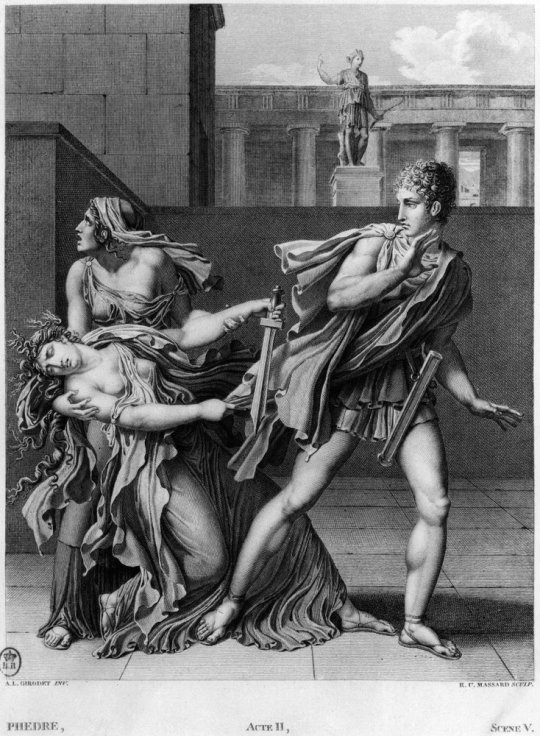
Phaedra, Oenone and Hippolytus, illustration from Act II Scene 5 of 'Phedre' by Jean Racine, engraved by Raphael Urbain Massard.
#greek mythology#ovid's metamorphoses#greek tragedy#jean racine#literature#raphael urbain massard#phaedra#oenone#hyppolytus#engraving
7 notes
·
View notes